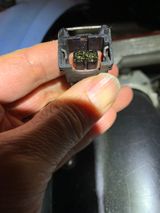Dielectric grease on 12V electrical connectors
Discussion
Everywhere I look with my Tuscan I come across electrical connectors that are slathered in dielectric grease. Example below.

Why do people do this?
I find it introduces poor connectivity. Clean it up, remove the grease and things are 100% better. Grease is often colourless but sometimes yellow as in the pic. Connections are often found with corrosion on them which I remove with light wet and dry and contact cleaner. It takes time depinning etc but it makes quite a difference to hunting down electrical gremlins in my car.
The only place I thought you use dielectric grease was with spark plug boots.
Why do people do this?
I find it introduces poor connectivity. Clean it up, remove the grease and things are 100% better. Grease is often colourless but sometimes yellow as in the pic. Connections are often found with corrosion on them which I remove with light wet and dry and contact cleaner. It takes time depinning etc but it makes quite a difference to hunting down electrical gremlins in my car.
The only place I thought you use dielectric grease was with spark plug boots.
Dalamar said:
Everywhere I look with my Tuscan I come across electrical connectors that are slathered in dielectric grease. Example below.

Why do people do this?
I find it introduces poor connectivity. Clean it up, remove the grease and things are 100% better. Grease is often colourless but sometimes yellow as in the pic. Connections are often found with corrosion on them which I remove with light wet and dry and contact cleaner. It takes time depinning etc but it makes quite a difference to hunting down electrical gremlins in my car.
The only place I thought you use dielectric grease was with spark plug boots.
I tend to agree. Why do people do this?
I find it introduces poor connectivity. Clean it up, remove the grease and things are 100% better. Grease is often colourless but sometimes yellow as in the pic. Connections are often found with corrosion on them which I remove with light wet and dry and contact cleaner. It takes time depinning etc but it makes quite a difference to hunting down electrical gremlins in my car.
The only place I thought you use dielectric grease was with spark plug boots.
I’ve disconnected the block connector from my alarm siren on a few occasions over a 15 year period which is situated just inside the grill opening on my Mk2 Chim so no protection from water ingress at all and it’s never showed much signs of water penetration and even did it a month or so ago and still has no corrosion on the terminals that would cause a poor connection, the siren makes a hell of a noise too

I understood it's meant to prevent water ingress, but it's not meant to be applied to any contacts as it would block the electrical signals.
I have found it applied to the back of the connectors in the door solenoid cavity, but only where the wires go into the connector, not where the contacts are made.
I also applied it to the back of the connector that goes into the wiper park switch, and around the rim of the entry point (but a very thin smear), ensuring none of it goes into the contacts.
I see it like a silicone sealant that never sets, but it also doesn't run or move from where you put it.
It's a lot like vaseline in texture and consistency.
But if it gets into the contacts, it acts as insulation and blocks the electrical signals.
I have found it applied to the back of the connectors in the door solenoid cavity, but only where the wires go into the connector, not where the contacts are made.
I also applied it to the back of the connector that goes into the wiper park switch, and around the rim of the entry point (but a very thin smear), ensuring none of it goes into the contacts.
I see it like a silicone sealant that never sets, but it also doesn't run or move from where you put it.
It's a lot like vaseline in texture and consistency.
But if it gets into the contacts, it acts as insulation and blocks the electrical signals.
Gassing Station | Chimaera | Top of Page | What's New | My Stuff




